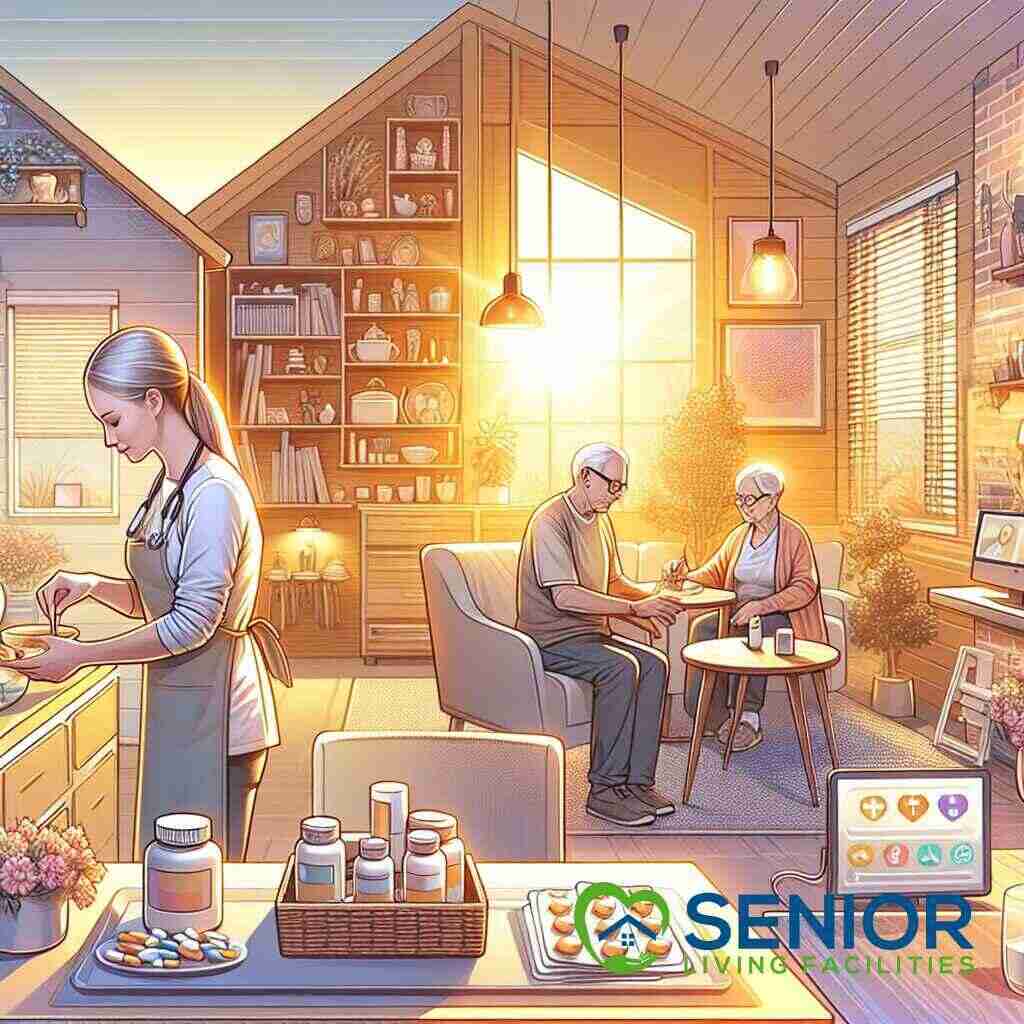
Review of In-Home Care Services Across the US
May 21, 2024
Understanding the Essentials of In-Home Care Services
Defining In-Home Care for Seniors
In-home care for seniors refers to a range of services provided in the comfort of an elderly person’s home, aimed at supporting their independence and well-being while aging. This personalized senior care at home ranges from basic assistance with daily activities to more intensive medical and nursing care. The primary objective of in-home care is to allow seniors to remain in their familiar surroundings for as long as possible, where they can feel safe, comfortable, and valued. The concept of in-home care is grounded in the belief that aging should be a respectful, dignified process, where the preferences and needs of the elderly are central to the care they receive.
The Spectrum of In-Home Care Services
The spectrum of in-home care services is broad, covering various types of assistance that cater to the differing needs of seniors. At one end of the spectrum are services focused on activities of daily living assistance, which include help with bathing, dressing, eating, and mobility. On the other end, professional home caregiving services for elders offer specialized medical care, including medication management, wound care, and therapy sessions. This diversity in services ensures that regardless of a senior’s health status or the progression of their needs over time, in-home care can be adapted to provide the right level of support. By encompassing a wide range of services, in-home care enables personalized care plans that are uniquely tailored to each individual, promoting their health, safety, and happiness.
How In-Home Care Supports Aging in Place
In-home care plays a pivotal role in supporting the concept of aging in place, allowing seniors to live safely and independently in their own homes for as long as possible. This approach to elder care is cherished for its ability to maintain the emotional and physical comfort of aging individuals by keeping them in a familiar environment. By receiving care at home, seniors can adhere to their personal routines and lifestyles, preserving their sense of autonomy and control over their lives. In-home care services not only cater to the medical and physical needs of seniors but also offer companionship and social interaction, which are crucial for preventing feelings of loneliness and isolation. As the demand for flexible, responsive senior care solutions grows, in-home care services continue to evolve, offering innovative ways to meet the complex needs of the aging population while respecting their desire for independence and dignity.
Benefits of Choosing In-Home Care for Seniors
Personalized Senior Care at Home
One of the most significant advantages of in-home care for seniors is the degree of personalization it offers. Every senior has unique needs and preferences, and in-home care can be tailored to match individual requirements closely. This personalized senior care at home ensures that seniors receive the right level of support, whether they need assistance with daily activities, medical care, or companionship. The ability to adjust and customize care plans as needs evolve is also an essential feature of in-home care, promoting optimum health and well-being for seniors in their own homes.
Enhancing Quality of Life for Seniors
In-home care significantly enhances the quality of life for seniors by allowing them to lead a life filled with dignity, comfort, and a sense of purpose. It helps maintain their daily routines and engage in activities they love, contributing to a happier, more fulfilling life. Caregivers can accompany seniors on walks, assist in hobbies, and facilitate social engagements, keeping their spirit and mind active. Furthermore, staying in a familiar environment can minimize the stress and confusion associated with transitioning to a senior living facility, especially for those with memory-related conditions.
Maintaining Independence in Familiar Surroundings
The desire to maintain independence is a strong motivation for many seniors to choose in-home care. Staying in their own home allows them to continue living life on their terms, within the comfort and familiarity of their surroundings. This independence is crucial for their self-esteem and overall mental health. Moreover, in-home care can be seen as affordable elder care at home in the US, providing the necessary support without the full-time transition to a senior living facility. It’s about providing assistance where needed while respecting the senior’s autonomy and preferences.
The Role of In-Home Care in Preventing Social Isolation
Loneliness and social isolation can have severe detrimental effects on the health and well-being of seniors. In-home caregivers provide not just physical support but also companionship, playing a crucial role in warding off these negative emotions. They become a familiar face, someone to talk to, share meals with, and engage in social activities. This companionship is invaluable for seniors who live alone, offering them a vital connection to the outside world. By providing emotional support and ensuring regular social interaction, in-home care services significantly contribute to the mental and emotional health of seniors, making them an ideal choice for those seeking both comfort and companionship in their golden years.
Evaluating In-Home Care Providers
Criteria for Selecting the Best In-Home Care Companies
Choosing the best in-home care provider for your loved one is a critical decision that requires careful consideration. The first step involves identifying companies that have a strong reputation for quality and reliability. Reading through senior living facilities reviews can offer insights into the experiences of other families, helping to highlight the companies known for their excellence in care and service. It’s essential to look for providers that offer a wide range of services tailored to the specific needs of seniors, including personal care, medical care, and companionship. Furthermore, the best in-home care companies are those that demonstrate flexibility, allowing care plans to adjust as the needs of your loved one change over time. A transparent pricing model is also crucial, ensuring families can budget effectively without the worry of hidden costs.
Licensing and Certification of Senior Home Care Agencies
When evaluating in-home care providers, verifying the licensing and certification status of the agency is paramount. In the United States, in-home care agencies are required to meet specific state regulations that ensure they provide safe, professional, and ethical care to seniors. By choosing licensed senior home care agencies near me, families can have peace of mind knowing that the agency adheres to the highest standards of operation. Licensing usually entails regular inspections and audits by state health departments, ensuring the quality of care provided remains consistent. Certification, on the other hand, may come from professional healthcare organizations and serves as a testament to the agency’s commitment to excellence in senior care. It’s essential to inquire directly with the agencies about their licensing and certification status, and to confirm this information through state health department databases.
The Importance of Experienced and Compassionate Caregivers
The heart of in-home care lies within the caregivers who provide daily support to seniors. An essential criteria in selecting an in-home care provider is the experience and compassion of their caregivers. It’s vital to look for agencies that have stringent hiring processes, including comprehensive background checks, professional references, and in-depth interviews. Caregivers should possess not only the technical skills required for the job but also the empathetic qualities that make them a comforting presence for seniors. Training and continuous education in senior care practices are indicators of a provider’s commitment to high-quality in-home care for aging adults. An experienced caregiver understands how to tailor their approach to accommodate the unique preferences and needs of each senior, making a significant difference in their overall well-being and quality of life. Establishing a good match between caregivers and seniors is also crucial, as it fosters a positive relationship that can greatly enhance the care experience.
Types of In-Home Care Services Available

Daily Living Assistance and Personal Care
When exploring the array of in-home care services, daily living assistance and personal care stand out as fundamental offerings designed to support seniors in their routine activities. This type of care includes, but is not limited to, aiding with bathing, dressing, meal preparation, and medication reminders. Such support plays a pivotal role in ensuring seniors can maintain their dignity and independence while receiving the necessary help to manage everyday tasks effectively. The objective is to provide a comfortable and safe environment where seniors receive the personalized assistance they require, enabling them to remain in their homes and communities as long as possible. Connecting seniors with caregivers who offer activities of daily living assistance also fosters a sense of companionship, greatly enhancing their quality of life.
Professional In-Home Nursing for the Elderly
Professional in-home nursing goes beyond basic care needs, offering medical support provided by licensed nurses or therapists directly in a senior’s home. This level of care is particularly beneficial for older adults who have health conditions requiring regular medical monitoring, wound care, injections, or physical therapy. The advantage of professional in-home nursing is the provision of high-quality medical care tailored to the individual’s specific health requirements, ensuring they receive comparable services to those available in a clinical setting but with the comfort and convenience of staying at home. Emphasizing high-quality in-home care for aging adults, professional in-home nursing is an ideal solution for families seeking comprehensive health care for seniors with complex medical needs.
Specialized Home Care Services for Chronic Conditions
Specialized home care services cater to seniors living with chronic conditions such as Alzheimer’s, Parkinson’s, diabetes, or heart disease. These services offer tailored care plans that address the specific challenges and requirements of each condition, providing not only medical support but also activities and therapies designed to improve quality of life and slow disease progression. Specialized care often involves a team approach, incorporating various healthcare professionals who work together to deliver a coordinated care plan that meets the evolving needs of the senior. The focus of specialized home care is on enhancing the well-being and independence of seniors, ensuring they have access to the support necessary to manage their conditions effectively while remaining in the comfort of their home.
Senior Companion Care Services
Senior companion care services offer an essential dimension to in-home care by focusing on the emotional and social well-being of the elderly. Companion caregivers provide company, engage in conversation, accompany seniors on outings, and assist with light household tasks, thereby preventing social isolation and promoting a vibrant lifestyle. This type of care is especially valuable for seniors who may be physically healthy but require interaction and activities to keep their spirits high. Companion care emphasizes the importance of building meaningful relationships, ensuring that seniors feel listened to, understood, and cared for beyond their physical needs. By offering friendship and emotional support, senior companion care services play a critical role in maintaining the mental health and general happiness of older adults, making them a cherished component of in-home care options.
Navigating the Costs of In-Home Care
Understanding the Pricing Models of In-Home Care Services
The realm of in-home care encompasses a wide range of services tailored to the needs of seniors, from daily assistance with personal activities to specialized medical care. Given the diversity of these services, understanding the pricing models can be crucial for families preparing to support their loved ones. Generally, in-home care services are billed on an hourly basis, ensuring flexibility to adjust the number of hours according to the evolving needs of the senior. For those requiring round-the-clock care, some agencies offer discounted rates for live-in or 24-hour care options. It’s critical to discuss with potential providers about their pricing structure, any minimum hour requirements, and how they handle overtime costs. Knowing this information up front can help families budget for care effectively and make informed decisions about the best type of care for their loved ones.
Finding Affordable In-Home Care for Seniors
Affordability is often a top concern when it comes to elder care services. To find affordable in-home care for seniors, it’s vital to explore various providers and compare their rates and services. Some communities and non-profit organizations may offer sliding scale fees or discounted services based on income levels, providing more affordable options for families. Additionally, many providers are willing to collaborate with families to create customized care plans that fit within a specific budget while still meeting the senior’s needs. It’s also worth investigating whether local or state programs could provide financial assistance or subsidies for in-home care services. By taking the time to research and ask the right questions, families can uncover more affordable paths to quality in-home care.
Exploring Insurance and Payment Options for Elder Care
As the costs of in-home care can accumulate, understanding insurance and payment options for elder care is essential for navigating these expenses wisely. Traditional health insurance plans may cover only limited aspects of in-home care, primarily medical or nursing services prescribed by a doctor. Long-term care insurance can be a valuable asset, as it often includes coverage for in-home care services, both medical and non-medical. Furthermore, government programs such as Medicare and Medicaid might offer some assistance, although eligibility and coverage limits can vary widely. Veterans may also be eligible for specific benefits through the VA. Preparing a financial strategy that potentially blends personal savings, insurance coverage, and any available public assistance can help families manage the costs of in-home care while ensuring their loved ones continue to receive the support they need.
Nationwide In-Home Care Providers and Their Offerings
As the aging population in the United States continues to grow, the demand for versatile and comprehensive in-home care services has never been greater. Families across the nation are in search of reliable, quality care solutions that respect the individuality and preferences of their loved ones. This segment explores the offerings of top nationwide in-home care providers, examining how they cater to the varied needs of seniors.
Reviewing Top Nationwide Senior Care Providers
The landscape of in-home care services is populated with a myriad of providers, each bringing a unique approach to senior care. Nationwide providers stand out by offering a broad spectrum of services that accommodate the diverse and evolving needs of seniors. These entities have developed robust networks of caregivers, enabling them to deliver consistent, high-quality care across all 50 states. From personal care and daily living assistance to professional nursing and specialized care for chronic conditions, these providers ensure that families have access to the support their loved ones need, wherever they are located. The backbone of these services is a commitment to employing experienced and compassionate caregivers who are well-versed in the nuances of senior care, building a foundation of trust and reliability with the families they serve.
Customized In-Home Care Plans Across the US
One of the most critical aspects of in-home care is the ability to tailor care plans to the individual needs of each senior. Nationwide providers excel in creating personalized care approaches that not only address the present needs of seniors but also anticipate future changes in their health status and preferences. This customization extends beyond the type of care received to include flexible scheduling options, accommodating seniors who may need just a few hours of assistance each week to those requiring round-the-clock support. By working closely with families and healthcare professionals, these providers ensure that every aspect of care is aligned with the senior’s lifestyle, health conditions, and personal preferences, promoting a higher quality of life and the opportunity to age gracefully.
Features of 24-Hour Senior Home Care Solutions
For seniors with complex medical conditions or those who require constant supervision, 24-hour senior home care solutions offer peace of mind to families. Nationwide providers of in-home care services have developed comprehensive 24-hour care programs that ensure seniors have access to the assistance they need at any time of day or night. These solutions are not just about addressing the physical needs of the senior, they also provide valuable companionship, preventing feelings of loneliness and isolation. Features of these round-the-clock care programs include regular health monitoring, medication management, emergency response, and coordination with medical professionals to manage and treat chronic conditions effectively. This level of care enables seniors to remain in their homes, preserving their independence and dignity, while still receiving the medical attention and support they require.
Through their expansive service offerings, nationwide in-home care providers play a crucial role in supporting America’s seniors. By prioritizing customization, reliability, and comprehensive care, these organizations ensure that families across the country have access to top-quality elder care solutions. Whether it’s facilitating a senior’s wish to age in place or providing specialized care for those with chronic conditions, the focus remains on enhancing the quality of life for seniors and offering peace of mind to their loved ones.
Connecting with the Right In-Home Care Services
How Senior Living Facilities Can Help Find In-Home Care
Finding the right in-home care services can be a daunting task for families and seniors. However, platforms like Senior Living Facilities play a pivotal role in simplifying this process. By leveraging their extensive knowledge of the senior care industry and a vast network of in-home care providers, they offer guidance and support in locating services that align with individual needs. Whether it’s round-the-clock medical care or occasional companionship and assistance with daily activities, Senior Living Facilities helps to narrow down the search by filtering options based on location, type of care required, and budgetary considerations. This personalized approach ensures that seniors and their families can find reputable, quality in-home care services that feel like an extension of the care and compassion one would hope for from their own family members.
Utilizing Online Tools to Compare Senior Home Care Options
In today’s digital age, online tools have become invaluable in the quest to find the best in-home care for seniors. Websites like Senior Living Facilities offer comprehensive resources that allow individuals to research and compare different senior home care options from the comfort of their home. These platforms feature detailed profiles of in-home care providers, including services offered, areas served, pricing models, and reviews from other families. By utilizing these online tools, families can make informed decisions about which in-home care services are most suited to their loved one’s needs and preferences, ensuring a better match between the senior and the caregiver. This streamlined approach to comparison not only saves time but also empowers families with knowledge, making the process of choosing in-home care a less stressful experience.
Steps to Connect with Licensed Senior Home Care Agencies Near You
Connecting with licensed senior home care agencies is crucial for ensuring the safety and well-being of seniors requiring in-home care. The process typically involves several key steps:
- Research: Begin by gathering information on senior home care agencies serving your area. Platforms like Senior Living Facilities are excellent starting points, offering a curated list of reputable providers.
- Verification: Once you’ve identified potential agencies, verify their licensing and certification status to ensure they meet all state regulations and standards for in-home care. This step is critical for confirming the legitimacy and quality of the services they offer.
- Consultation: Contact the agencies directly to discuss your specific needs and preferences. This is an opportunity to ask questions about the caregivers’ qualifications, experience, and whether they can offer the type of care required, from daily living assistance to specialized nursing care.
- Assessment: Most reputable agencies will request an in-home assessment to better understand the senior’s needs and living situation. This evaluation helps them customize their care plans and match the senior with the most suitable caregiver.
- Selection: Based on the assessment and your interactions with the agency, select the service that best fits your loved one’s needs. Ensure that there’s a clear agreement on the terms of care, including services provided, pricing, and mechanisms for feedback and adjustments to care plans.
Senior Living Facilities and other similar platforms can guide families through each of these steps, making the process of finding and connecting with licensed senior home care agencies near you easier and more reliable. By following these steps, families can confidently secure the best possible in-home care for their loved ones, ensuring they receive the compassionate, professional assistance they deserve.
Ensuring Continual Support and Satisfaction
Monitoring the Quality of In-Home Care
Properly monitoring the quality of in-home care is vital to ensure that seniors receive the best possible support for their needs. Continuous quality assessment involves regular check-ins by the in-home care provider’s management to evaluate the care given and the caregiver’s performance. These evaluations can be conducted through direct observations, senior feedback, and family discussions. Additionally, implementing standardized care quality metrics assists in maintaining high care standards consistently. For seniors and families partnering with in-home care services, it’s crucial to have open lines of communication with the providers. This enables any concerns to be addressed promptly and adjustments to be made, ensuring the care remains of the highest quality. Monitoring efforts help in identifying areas for improvement, leading to immediate actions that enhance the senior’s well-being and satisfaction with the care received.
Adapting Care Plans to Meet Evolving Needs
As seniors age, their needs can change, sometimes rapidly. An effective in-home care service is marked by its ability to adapt to these evolving needs efficiently. Regular assessments conducted by professional care managers can pinpoint changes in health status, mobility, or personal preferences, signaling when a care plan requires adjustments. This dynamic approach ensures that the care provided aligns with the current and future needs of the senior, fostering a supportive and flexible environment at home. Tailoring care to meet these changing needs not only promotes better health outcomes but also enhances the senior’s quality of life. Such adaptability underlines the personalized nature of in-home care, setting it apart as a genuinely responsive and compassionate service option for families.
Communication Between Families, Seniors, and Care Providers
Effective communication forms the backbone of successful in-home care, bridging the gap between families, seniors, and care providers. Open, honest dialogues help in building trust and ensuring that the care delivered meets the expectations and needs of both the senior and their family. It involves regular updates on the senior’s health and well-being, discussions about any necessary adjustments to care plans, and the provision of support for families navigating the challenges of elder care. Incorporating technology, such as digital care management platforms, can facilitate seamless communication, allowing family members to stay informed and engaged in their loved one’s care, regardless of their location. This collaborative approach not only empowers seniors by involving them in decisions about their care but also reassures families that their loved ones are in good hands.
Empowering Seniors Through Quality In-Home Care
Encouraging Active Participation in Care Decisions
One of the pillars of quality in-home care for seniors is empowering them to take an active role in their care decisions. This approach fosters a sense of autonomy and respect, which is crucial for the emotional well-being of elderly individuals. Encouraging seniors to express their preferences and concerns allows for a more personalized care experience, tailored to their specific desires and needs. This participatory model not only enhances the effectiveness of the care provided but also builds a solid foundation of trust between seniors, their families, and caregivers. As seniors feel more involved in their care planning, they are more likely to adhere to care recommendations and engage positively with their caregivers, leading to better overall health outcomes.
Promoting Safety and Well-being at Home
The safety and well-being of seniors at home are paramount, and quality in-home care services go to great lengths to prioritize these aspects. By implementing comprehensive safety assessments, caregivers can identify potential hazards around the home and suggest modifications to prevent accidents. Such assessments are integral to creating a secure living environment that supports the senior’s independence while mitigating risks. Moreover, promoting well-being extends beyond physical safety to encompass mental and emotional health. Tailored activities, social engagement opportunities, and constant companionship are just a few ways in-home care services work to uplift the spirits of seniors, ensuring they feel valued, connected, and content in their golden years.
The Future of Home Health Care for Seniors
The future of home health care for seniors is marked by innovation and personalized service, with a growing emphasis on technology and holistic care. Telehealth services are becoming a cornerstone of in-home care, allowing seniors to consult with healthcare professionals without leaving their homes. This innovation provides a convenient, efficient way to manage health conditions, reducing the need for frequent hospital visits. Additionally, advancements in smart home technology and wearable health devices offer real-time monitoring of vital signs and activity levels, enabling proactive management of health concerns. As the demand for in-home care services continues to rise, the industry is set to evolve, offering more dynamic, customized care solutions that cater to the diverse and changing needs of the aging population. With the focus firmly on enhancing the quality of life for seniors, the future of in-home care is bright, promising a new era of empowerment, comfort, and well-being for older adults.
By shifting the paradigm to prioritize the active involvement of seniors in their care, ensuring their safety and well-being, and embracing technological advancements, the in-home care sector is poised to offer unprecedented support to America’s elderly. This evolution in senior care underscores the dedication to providing compassionate, individualized care that respects the dignity and wishes of every senior, paving the way for a more nurturing, safe, and fulfilling aging experience.
Frequently Asked Questions
Question: What types of personalized senior care at home do Senior Living Facilities recommend based on your ‘Review of In-Home Care Services Across the US’?
Answer: At Senior Living Facilities, we understand the importance of personalized care for seniors, ensuring they receive the support they need in the comfort of their own homes. Our ‘Review of In-Home Care Services Across the US’ highlights the spectrum of personalized senior care at home options available, ranging from daily living assistance, senior companion care, to more specialized medical care and in-home nursing for the elderly. We work closely with nationwide senior care providers to offer bespoke solutions tailored to each senior’s unique needs, ensuring they benefit from a quality in-home care experience that enhances their independence and well-being.
Question: How can Senior Living Facilities help me find affordable in-home care for seniors in my state?
Answer: Senior Living Facilities is dedicated to helping families and individuals find affordable in-home care for seniors across all 50 US states. By using our platform, you can easily search for and compare various in-home care services, including licensed senior home care agencies near you. We provide access to a vast network of providers offering a range of cost-effective, quality care options from personalized senior care at home to 24-hour senior home care solutions. Our team is committed to assisting you in navigating the options available, ensuring you find a senior home care solution that aligns with your budget and meets your loved one’s needs.
Question: What makes Senior Living Facilities a reliable source for finding professional in-home care for elders?
Answer: Senior Living Facilities stands as a reliable source for finding professional in-home care for elders due to our comprehensive approach in vetting and partnering with only the best in-home care companies across the nation. Our platform is designed to only feature services from licensed senior home care agencies that have a proven track record of offering high-quality in-home care for aging adults. We ensure these providers deliver a wide range of senior assistance services at home, from daily living support to specialized medical care, upholding our commitment to quality and reliability. Moreover, our platform also offers valuable resources and reviews, helping families make informed decisions based on real-life experiences and outcomes.
Question: Can Senior Living Facilities assist with finding specialized home care services for chronic conditions?
Answer: Absolutely, Senior Living Facilities specializes in assisting families and seniors in finding specialized home care services for chronic conditions such as Alzheimer’s, Parkinson’s, and other long-term health issues. Our extensive network includes providers that offer customized in-home care plans, focusing on managing and improving the quality of life for seniors with chronic conditions. These services range from professional in-home nursing for the elderly to comprehensive support like medication management, therapeutic exercises, and coordination with healthcare professionals to ensure a holistic approach to care that addresses both the medical and personal needs of seniors.
Question: How does Senior Living Facilities ensure that the senior companion care services recommended are of high quality?
Answer: Senior Living Facilities ensures the high quality of recommended senior companion care services by strictly partnering with service providers that demonstrate a strong commitment to compassionate, person-centered care. We evaluate the training, experience, and background of caregivers, emphasizing the importance of not just meeting the physical needs of seniors but also enriching their emotional and social well-being. The agencies we include must pass a thorough assessment process, showing evidence of satisfactory client feedback, adherence to best practices in companion care, and a genuine dedication to creating meaningful connections between caregivers and seniors. These rigorous selection criteria solidify our aim to recommend only those senior companion care services that align with our standards for promoting happiness, companionship, and quality of life for seniors.



